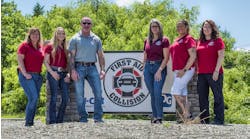You have all the tools lying around the shop to complete nearly any task a customer has when they pull into your bay. But just as important as being able to serve your customers is protecting your business from fires those tools and supplies could cause. “When I go out and visit customers, especially a single point operation or the small business owner, I try to tell them probably the biggest threat to their business is a fire,” says Daryl Allegree, regional manager of Zurich Risk Engineering in North America. “I tell them all the things they can do to prevent fires in the first place (training, proper storage and safety) that are all critical to them because a fire can put them out of business.” According to Zurich North America Commercial's Direct Markets business unit, properly storing flammable liquids is one of the best ways to prevent fires. Gasoline, paint thinners, brake cleaner and other solvents used in working on vehicles can create vapors that are subject to ignition sources from pilot lights, welding equipment, discarded cigarettes, lights and other areas. While some tips might seem elementary, it can’t hurt to review them with your technicians and other employees. • Store gasoline outside the building whenever possible. If it must be stored inside, keep gasoline in CSFM- (California State Fire Marshal) or UL-approved receptacles. • Transfer gasoline out of tanks prior to removing them from the vehicle and do so outside. Dealerships, collision repair operations and standard auto repair garages should seek input from their insurance carriers and agents about proper procedures and equipment for handling gasoline and draining it from vehicle fuel tanks to minimize fire risks. • Clean up all spills as quickly as possible. • Avoid using incandescent utility lights around gasoline. • Limit quantities of flammable liquids in the work area to one day’s supply. • If flammables must be stored inside your primary facility, build a storage room for flammable liquids or install a prefabricated room with explosion-proof electrical equipment, a 24-hour mechanical ventilation system, a self-closing door, and a fire-suppression system. • Attach ground wires to open drums to eliminate the potential for electrical charges between the drum and ground. Otherwise, there is a possibility of generating electrical sparks. • Ask suppliers to provide alternative non-flammable solvents, if they are not already doing so. • Switch to a water-based parts washing system. When the worst happens “Number one is promptly report the loss. That’s crucial for the right start in the process,” says Randy Townsend, Zurich assistant vice president. “After the loss, review the insurance coverage with the adjuster or agent. If you don’t have a copy of your policy because it's destroyed in the loss event, ask for a copy – and review it. You want to try to address any issues that come up early in the process." Keeping a copy of your insurance policy is a good idea, Allegree says, adding that it should be kept off-site with other paperwork Townsend suggests, “Have backup financials and important papers. If you can, either keep them off-site or in a fireproof safe or other secure area,” he says. “That’s one of the hardest things to try and reconstruct if they’re destroyed.” Also, it’s important to not disturb anything at the shop if at all possible. “Say, for example, a car’s in the stop overnight and it catches fire,” Townsend offers. “Until you’ve talked to the adjuster or the fire inspector, there may be a recall on the car or other subrogation possibilities.” Organizing your questions “Is there a co-insurance requirement, and if so, what amount of coverage do you need to comply with that co-insurance?” Townsend adds. “If you’re underinsured, you could stand to lose in a couple of ways. Number one, because you’re underinsured and also from a co-insurance end.” Other questions include what will be covered or is required for code improvements (especially if you’re in an older building), what demolition costs are covered (such as for undamaged parts of the building), are continuing expenses such as payroll and leases covered and what is covered when looking at vehicles in the shop and on the lot. And beyond fires and other catastrophic events, flood insurance is also important to consider. “That’s so sad to see how many people are not insured through the National Flood Insurance Program,” Townsend says. “I know that insurance is very expensive in this day and age, but if you avoid that expense when you're in a flood-prone area, it’s very easy to project what that outcome is going to be.” Getting employees on board And if they’re not, well perhaps part of your disaster plan should involve communicating with employees as this is their livelihood as well. “We can’t replace the lost business, the customers they lose that go someplace else while they’re out of business,” Allegree says. “I try to impress upon them this could be the purpose of insurance and any other catastrophe planning programs to ensure their survival. They should know a fire can kill their business.” |
Latest in Operations
Latest in Operations
Articles
Dumping Your DRPs
July 24, 2024
Articles
Preparing for Inspections
July 15, 2024
Articles
Playing the Long Game
July 8, 2024



